Many fitness myths can derail your progress, so let's clear them up. Cardio does increase muscle tone by working various muscles, and combining it with strength training boosts your overall results. Don't push through pain; it can lead to injury. More protein is essential for muscle building—aim for 1.2-2.0 grams per kilogram of body weight. Working out on an empty stomach isn't ideal because it affects performance and energy levels. Sweat doesn't indicate workout quality; focus on effort instead. Timing your workouts can improve results—mornings boost metabolism, while evenings enhance strength. Stick around to uncover more fitness truths.
Key Takeaways
- Regular cardio workouts enhance muscle tone and definition, contrary to the myth that only strength training does.
- Pushing through pain during workouts can lead to serious injuries; distinguish between discomfort and pain.
- Protein intake of 1.2-2.0 grams per kilogram of body weight is essential for muscle growth and recovery.
- Sweat is not an indicator of workout intensity; focus on the quality and effectiveness of the exercise.
- Exercising on an empty stomach can hinder performance and energy levels, making pre-workout nutrition crucial.
Cardio Increases Muscle Tone
Engaging in regular cardio workouts can greatly enhance muscle tone and definition. You might think cardio's just for burning calories, but surprise! It also helps build muscle.
Whether you're running, cycling, or swimming, you're engaging various muscle groups, turning your body into a lean, mean, sculpted machine.
Cardio workouts, especially interval training, not only boost metabolism but also improve cardiovascular health. The secret sauce? Combining cardio with strength training.
This dynamic duo maximizes your muscle tone, giving you that chiseled look without turning you into the Hulk. So, lace up those sneakers, hit the pavement, and watch your muscles pop without the need for a cape or spandex suit.
Who knew cardio could be your muscle-making sidekick?
No Pain, No Gain
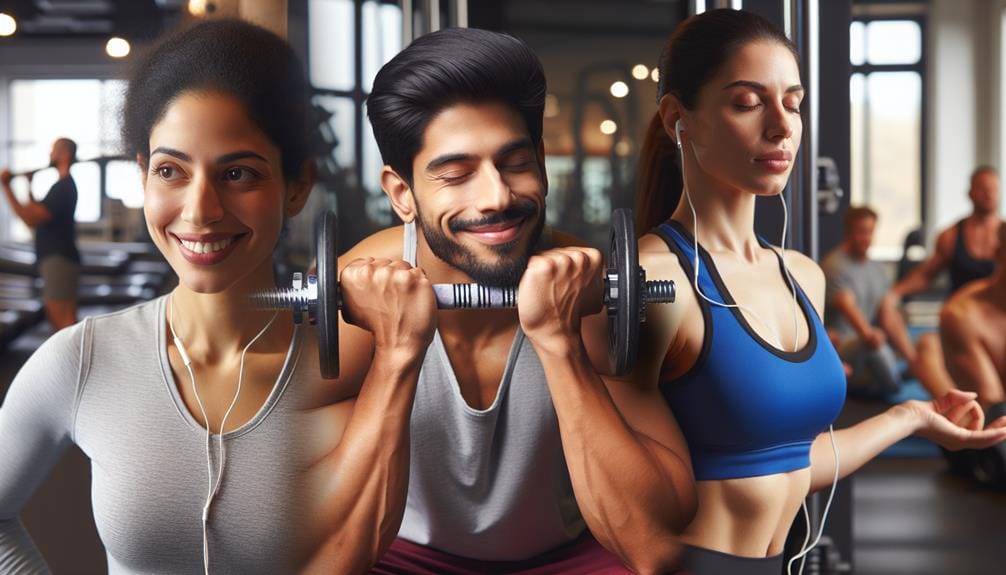
Although the saying 'no pain, no gain' is popular, it's important to differentiate between discomfort and actual pain during workouts. Feeling some discomfort is normal; it means you're working those muscles. But if you're experiencing pain, it's a sign to stop working immediately. Pushing through pain can lead to serious injuries, and nobody wants to hobble around like a pirate on leg day.
Always listen to your body. If the pain persists after physical activity, take a break and seek medical advice. The 'no pain, no gain' mentality can be counterproductive, leading to overexertion and increased injury risk.
Extra Protein Builds Muscle
While it's important to listen to your body to avoid injury, it's equally vital to understand how extra protein can help build and repair muscles after a workout.
Think of protein as your muscles' best friend, swooping in to save the day. For ideal muscle growth, aim for a protein intake of 1.2-2.0 grams per kilogram of body weight.
Whether you're munching on chicken, fish, eggs, or legumes, these protein-rich foods pack essential amino acids. If you're hitting intense workouts, consider protein supplements to meet your needs.
Timing is key—consuming protein around your workouts enhances muscle recovery and maximizes muscle protein synthesis. So, don't just lift; fuel up right and let those muscles grow!
Workout Builds Muscle Only
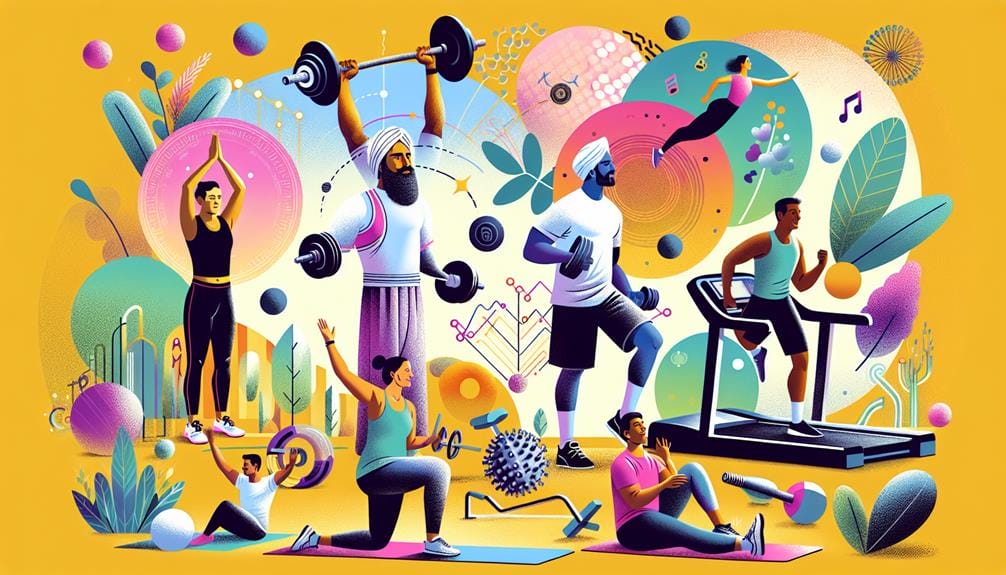
You might think workouts only build muscle, but they do much more. Strength training also helps burn fat, improve cardiovascular health, and boost your mental well-being.
Muscle and Fat Burning
Can building muscle through your workouts help burn fat effectively? Well, here's the scoop: weight training doesn't magically turn muscle into fat.
However, it does help boost your metabolism, making it easier to reduce overall body fat. Think of muscle as your body's fat-burning engine; the more muscle you have, the more calories you burn, even when you're just binge-watching Netflix.
But don't toss your cardio just yet! While weight training builds muscle and tones you up, fat loss happens through a caloric deficit and overall body fat reduction.
Cardiovascular Health Benefits
Cardiovascular workouts not only help you build muscle but also greatly enhance your heart health. So, don't just lift weights and call it a day—mix in some cardio workouts like running, swimming, or cycling.
These activities boost your cardiovascular health by increasing blood circulation and strengthening your heart muscle. Regular cardio can lower your blood pressure, reduce cholesterol, and markedly decrease your risk of heart disease.
Plus, cardio workouts burn calories, helping you shed those extra pounds for a healthier body composition. Remember, a well-rounded fitness routine that combines strength training with cardio not only builds muscle but also keeps your heart ticking like a well-oiled machine.
Mental Health Boost
Engaging in regular exercise not only builds muscle but also provides a significant boost to your mental health. When you work out, those endorphins kick in, making you feel like you've conquered the world—or at least your to-do list. Plus, all that blood flow to your brain helps you think clearer and might even make you a trivia night champion. Not to mention, seeing those muscle gains in the mirror can boost your confidence like nothing else.
Here's a quick breakdown:
| Benefit | Explanation |
|---|---|
| Endorphin Boost | Improves mood, reduces stress |
| Enhanced Cognition | Increases blood flow to the brain |
| Depression Relief | Reduces symptoms of depression |
| Better Self-Esteem | Boosts confidence and self-worth |
| Emotional Balance | Promotes a positive mindset |
Best Time to Train

When considering the best time to train, it's important to weigh the benefits of different times of day. Morning workouts can kickstart your metabolism and energy levels, while evening sessions might enhance your performance due to higher body temperature.
Ultimately, finding a consistent training time that fits your schedule and listening to your body's natural rhythms will help you stick to your fitness goals.
Morning Workout Benefits
Morning workouts offer numerous benefits that can enhance your overall health and well-being. First off, they can boost your metabolism, giving you that extra fat-burning edge— who doesn't love the idea of burning calories while sitting at your desk? Plus, morning workouts help you start your day with a gold star for productivity. You'll find yourself more focused and ready to tackle your to-do list.
Here's why you should give morning workouts a go:
- Boost Metabolism: Kickstart your calorie burn.
- Fat Burning: Enhance fat burning due to overnight fasting.
- Better Sleep: Regulate your sleep patterns.
- Positive Tone: Set a healthy tone for the day.
Evening Training Advantages
Many fitness enthusiasts find that evening training offers significant advantages for muscle strength and overall performance. By the time evening rolls around, your body temperature is higher, giving you better joint flexibility and reducing injury risks.
Plus, your testosterone levels peak, boosting your muscle growth potential during evening workouts.
Think of it this way: your body's a finely-tuned machine, and evening is when it's revved up and ready to go. You're also more mentally alert and focused, making your workouts more productive.
And hey, a good workout can help you unwind, improving your sleep quality and aiding muscle repair overnight.
Consistent evening workouts can help you establish a routine, ensuring long-term fitness success. So, why not give it a try?
Spot Reduce Fat
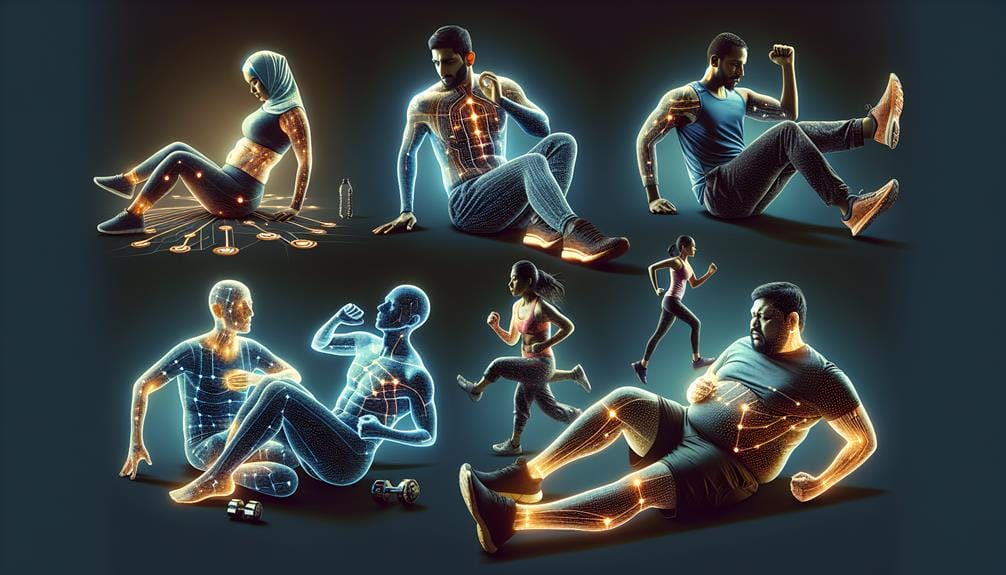
Contrary to popular belief, you can't spot-reduce fat by targeting specific areas through exercise. If you're trying to lose weight, especially belly fat, doing endless core exercises won't give you a six-pack. Here's why:
- Fat Loss is Overall: You need to reduce your overall body fat percentage through a combo of diet and exercise.
- Core Exercises Strengthen, Not Shrink: They build muscle but don't specifically burn belly fat.
- Proper Form is Essential: Incorrect technique can strain your neck and back.
- Consistency is Key: Regular exercise and a balanced diet are essential for visible abs.
Muscle Turns to Fat
It's a common misconception that muscle can turn into fat when you stop exercising. Spoiler alert: muscle and fat are like oil and water—they just don't mix!
When you quit working out, your muscles don't magically transform into fat; rather, you experience a loss of muscle. This can slow your metabolism, making you more susceptible to weight gain if you keep eating the same amount of pizza.
To keep this from happening, incorporate regular strength training into your routine. Strength training helps you maintain muscle mass, ensuring your muscles stay firm and fabulous.
More Sweat, Better Workout

Have you ever thought that the more you sweat, the better your workout? Well, it's time to bust that myth!
Sure, dripping sweat might make you feel like a fitness warrior, but it doesn't actually indicate calorie burn or workout intensity. Here's the scoop:
- Sweat is Just Cooling: Your body sweats to cool down, not to show off your calorie burn.
- Genetics at Play: Some people sweat more due to genetics, not because they're working harder.
- Temperature and Hydration: Hotter environments and hydration levels also affect how much you sweat.
- Quality Over Quantity: Focus on the intensity and quality of your workout, not just the sweat.
Empty Stomach Workouts
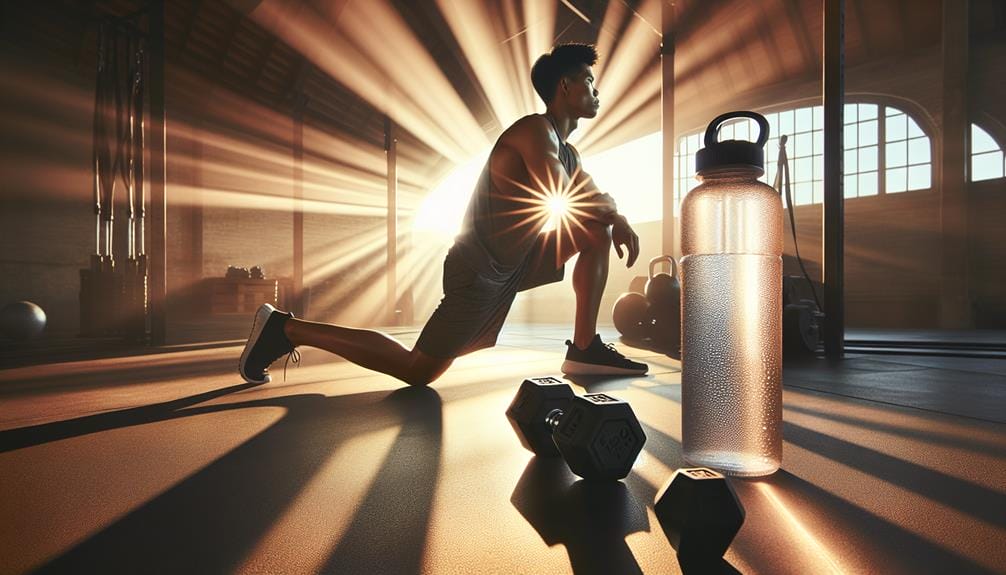
Working out on an empty stomach might sound appealing, but it can actually hinder your performance and energy levels. Sure, you might think you're burning extra fat, but in reality, you're more likely to lose muscle mass.
Pre-workout nutrition is your friend here—think of it as your workout buddy who brings snacks. Eating a light, easily digestible snack before exercise can boost endurance and prevent muscle breakdown.
Remember, a balanced meal 1-2 hours before hitting the gym provides essential nutrients for energy and muscle function. Just steer clear of heavy meals close to exercise unless you enjoy feeling like a stuffed turkey during your squats.
Conclusion
In wrapping things up, don't let fitness myths lead you astray. Cardio won't magically tone muscles, and 'no pain, no gain' isn't a golden rule.
Extra protein doesn't guarantee muscle growth; balanced diets do. Remember, workouts don't just build muscle; they improve overall health.
Spot reduction is a myth, and muscle can't turn to fat. Sweating more doesn't mean a better workout, and empty stomach workouts aren't always beneficial.
Stay informed, stay fit, and don't get fooled.
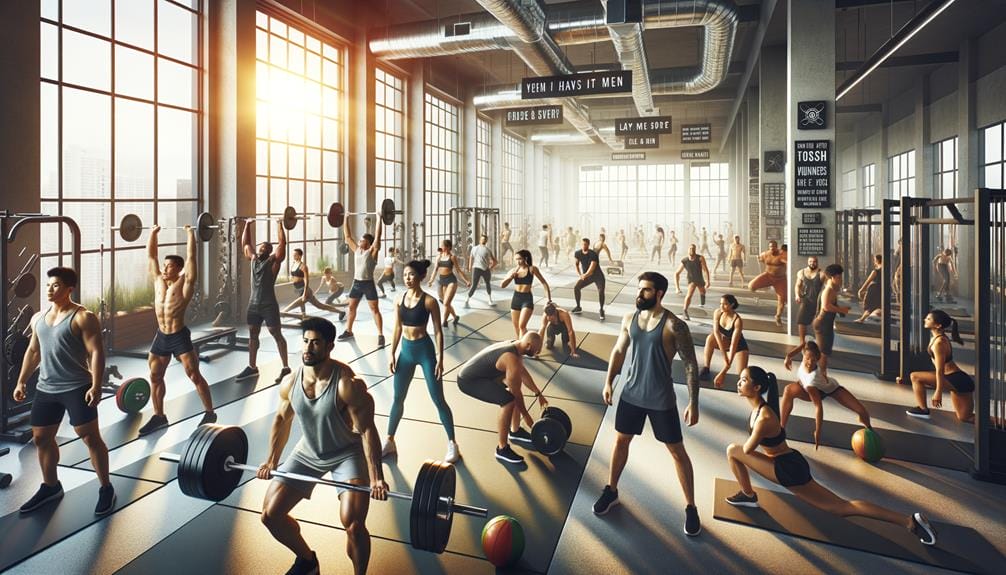








Leave a Comment